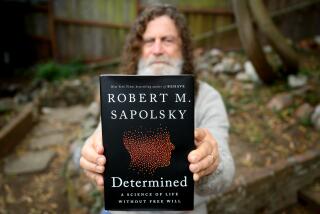Ability to believe may be in the genes
- Share via
The God Gene
How Faith Is Hardwired
Into Our Genes
Dean H. Hamer
Doubleday: 242 pp., $24.95
*
Humans “have had spiritual beliefs since the dawn of our species,” molecular biologist Dean Hamer writes in his fascinating if scholarly work “The God Gene,” which argues that the capacity for faith may be part of our genetic makeup. More than 30,000 years ago, he tells us, our ancestors painted the walls of their caves with images anthropologists believe to be sorcerers or priests. They buried their dead with elaborate preparations for the afterlife. “These,” he contends, “are the actions of believers.”
Faith continues to be a strong element in contemporary lives. Hamer cites surveys showing that more than 95% of Americans believe in God, 90% meditate or pray, 82% say God performs miracles, and more than 70% believe in life after death. What is it that makes us so disposed toward spirituality and faith? Were we programmed by a creator to be inclined toward faith in the metaphysical, or is belief just a fluke of evolution that we hold onto?
In searching human DNA for proof that we’re hard-wired to believe, Hamer hits what he considers to be pay dirt with the gene VMAT2. He starts with the assumption that all humans are born with a capacity for faith. For some, that capacity is large and they are naturally drawn toward the spiritual dimensions of life. For others, the capacity may be slight and they are disinclined to believe ideas that others may easily embrace. Where we fall on this continuum, he contends, has to do with how the gene stimulates a protein that controls the amount of brain-signaling chemicals.
“Interestingly,” he notes, “these same brain chemicals can be triggered by certain drugs that can bring about mystical-like experiences.”
The self-transcendence scale, used by behaviorists to quantify spirituality, has nothing to do with religious adherence. Rather, it measures qualities such as self-forgetfulness, in which a person loses track of time while absorbed in an experience, such as listening to music (an experience psychologists call a “flow state”), feelings of a sense of unity, as if everything were part of one living organism, or a fascination with things that can’t be explained by science, such as seeing a freed-up parking space, for example, as evidence of larger forces.
By analyzing twin and sibling studies, Hamer asserts that most of what influences our spiritual intensity -- not the beliefs themselves, which are learned, but the degree to which we believe them -- is predominantly genetic in nature. Spirituality, at least as measured by self-transcendence, he tells us, does not result from outside influences. “Contrary to what many people may believe, children don’t learn to be spiritual from their parents, teachers, priests, imams, ministers, or rabbis, nor from their culture of society.... Spirituality comes from within. The kernel must be there from the start. It must be part of their genes.” Thinking along evolutionary, survival-of-the-fittest lines, he writes: “There is now reasonable evidence that spirituality is in fact beneficial to our physical as well as mental health. Faith may not only make people feel better, it may actually make them better people.”
Though the narrative gets bogged down at times with statistical analysis and discussions of different brain chemicals and how they work, Hamer brings a nice sense of humor to the material. (“Putting serotonin into a dopamine receptor would be like dressing Aretha Franklin in an outfit designed for Cher. It doesn’t fit.”) Science doesn’t yet completely explain why some of us believe, nor tell us definitively if what we believe is in any way true. Still, he makes a compelling case that spirituality very well may be part and parcel of our genetic structure.





